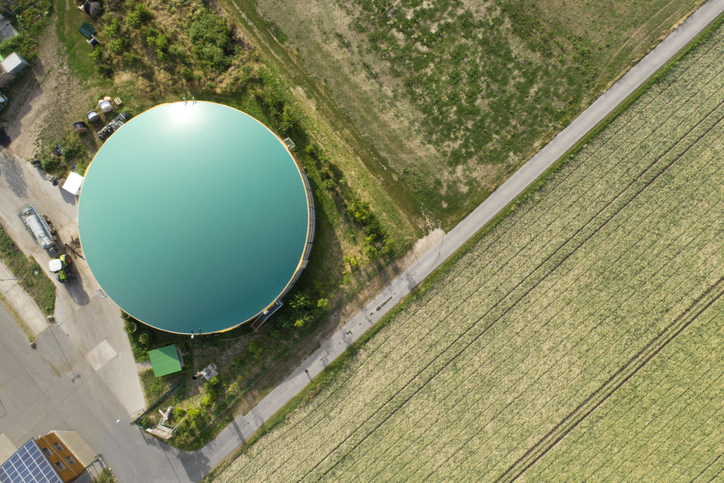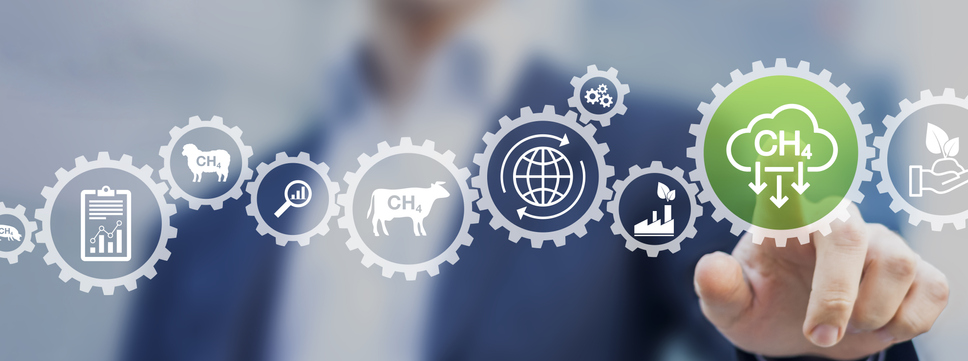Spotlight On: Methane

As the destructive effects of a warming climate increase, the rapid reduction of greenhouse gas (GHG) emissions becomes ever more critical. One GHG in particular presents a key opportunity to reduce the amount of warming the Earth will experience over the next two decades—methane.
Methane is a powerful and short-lived GHG, over 80 times more potent than carbon dioxide at trapping heat in the atmosphere over 20 years. Methane is responsible for 30 percent of the current rise in global temperatures and its atmospheric concentrations in 2019 were the highest of any year in the past 800,000 years. Its disproportionate impact means reducing methane emissions can help countries achieve climate mitigation benefits quickly while also buying time to implement strategies to reduce longer-lived GHGs.
Reflecting this growing understanding, the Global Methane Pledge—launched at the 2021 UN Climate Change Conference (COP26)—represents the single largest methane reduction initiative in history and aims to reduce methane emissions by at least 30 percent by 2030, from 2020 levels. More than 100 countries have signed on to the Pledge articulating their commitments to methane reduction across key contributing sectors including agriculture (manure management and enteric fermentation), waste (landfills, wastewater treatment facilities), and energy (oil & gas operations, leaking pipelines, and abandoned coal mines).
Mobilizing finance, ensuring policy cohesion, equipping project developers with best practices for financial and technical feasibility, and ensuring transparency and rigor in the accounting and reporting of methane emissions—these are all critical building blocks to making the Global Methane Pledge deliver real results. Abt Global has been at the forefront of supporting such efforts to address methane pollution globally. We are ready to deploy our deep technical resources, broad set of partners, and proven tools to enable coordinated and meaningful action on methane at all needed scales, from the national to project level.

Expertise
Abt has more than two decades of experience supporting flagship programs targeting methane mitigation in the U.S. and around the world. From building foundational resources for the U.S. EPA on behalf of the Global Methane Initiative (originally the Methane to Markets program) since 2005, to providing strategic support to EPA’s complementary efforts under the Climate and Clean Air Coalition (CCAC) since 2013, to strengthening key sector programs such as EPA's Coalbed Methane Outreach Program (CMOP) and AgSTAR programs, Abt provides technical assistance to stakeholders focused on advancing methane mitigation and capture strategies across all methane-generating sectors: agriculture, municipal solid waste (MSW), wastewater, coal, and oil and gas. We prepare market and technology needs assessments, conduct technical trainings, and develop tools to support project screening and decision making. Our expertise includes:
- Technical feasibility assessments
- Financial analyses and methane finance mobilization
- Measurement, reporting, verification (MRV)
- Capacity building, tool development, training, and workshopping
- Strategic communications and planning
- Governance, regulatory and policy support
- Sector-wide opportunity assessment
- Health and economic co-benefit quantification
- Geospatial and sensor analytics and dashboarding

Featured Capabilities
Global Methane Pledge Fundamentals: Measurement, Reporting and Verification and Implementation Tools
MRV Abt has unrivaled knowledge of methane measurement, verification, and reporting (MRV), critical to making the Global Methane Pledge a reality. From emissions inventories to predictive modeling and geospatial analytics, our user-friendly online informatics accelerate on-the-ground GMP action.
On EPA's behalf, Abt has produced digital tools and resources that have helped project developers, governments, and implementers design methane mitigation strategies and bring projects on-line that yield financial, environmental, and public health benefits. Key to this is assessing the feasibility and benefits of potential projects and technologies, such as food waste digesters that produce valuable biogas. Tools and resources we have developed with EPA for the Global Methane Initiative and Climate and Clean Air Coalition have been used by dozens of countries and hundreds of projects worldwide. These include:
- Biogas Toolkit
- Anaerobic Digestion (AD) Screening Tool
- OrganEcs for AD and Composting
- Landfill Gas Screening Tool
- Solid Waste Emissions Estimation Tool (SWEET)
- MRV Resource Center
The SWEET tool has been used by more than 50 cities–from Delhi, India, to Novi Sad, Serbia—to estimate waste sector methane emissions and plan mitigation strategies. In India, Abt assisted EPA in conducting a feasibility assessment on the use of biogas to power cooling systems in rural regions of Maharashtra. We used both Anaerobic Digest Screening Tool and OrganEcs for AD to estimate the biogas production potential and financial feasibility of anaerobic digestion projects to supply biogas to cold storage systems.


